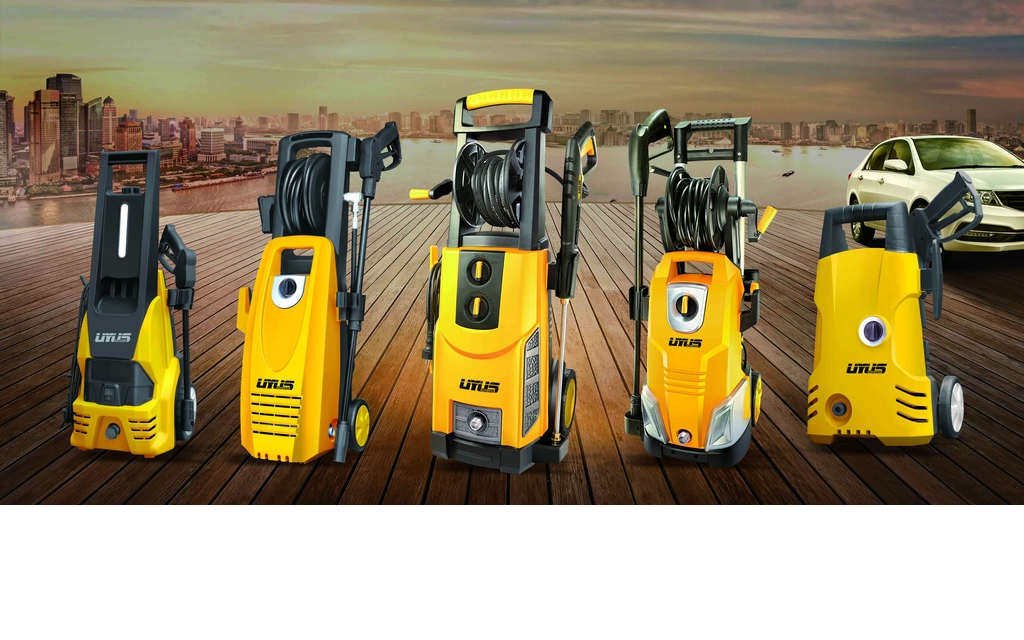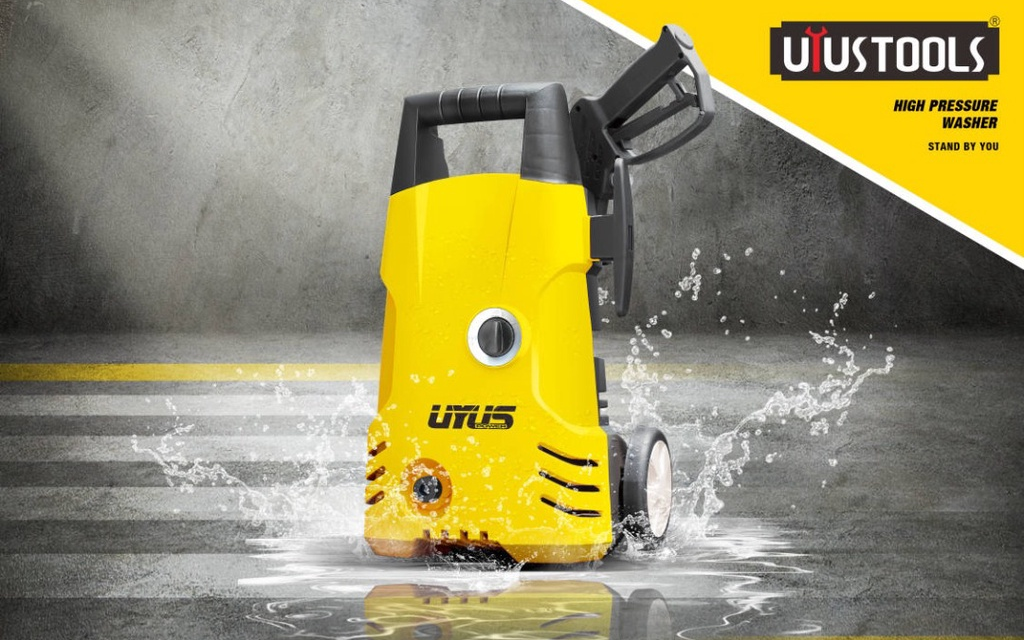Navigation
A high-pressure washer is an essential tool for intensive outdoor cleaning tasks. Powerful jets of highly pressurized water allow you to blast away stubborn dirt, grime, and contaminants from surfaces like driveways, decks, patios, vehicles, and outdoor equipment.
Choosing the right high-pressure washer ensures you get the cleaning performance you need for specific jobs, while the right features and accessories improve ease of use and versatility. This guide will help you understand how high-pressure washers work and what to look for when buying one.

What is a High-Pressure Washer?
A high-pressure washer consists of an electric- or gas-powered motor that drives a water pump. The pump pressurizes water from a tap or hose to create powerful cleaning jets. Water pressure is measured in PSI (pounds per square inch) or Bar (metric unit). Standard household water pressure is 30-80 PSI. High-pressure washers generate 500-4000 PSI for intensive cleaning tasks. Higher PSI means increased cleaning power. But too high pressure can damage delicate surfaces, so matching the washer’s PSI rating to your cleaning needs is important.
You may want to know: The Best Power Tool Brand from China for Homeowners in 2023.
How to Choose Your High-Pressure Washers?
Choosing the right high-pressure washer depends on your specific needs and the type and frequency of tasks you’ll be using it for. Here’s a comprehensive guide to help you make the right choice:
1. Determine Your Cleaning Needs
The first step is determining what tasks you’ll use the washer for. Will you use it for light duties like washing cars, outdoor furniture, or small patios? Or do you need it for heavier tasks such as cleaning large decks, driveways or stripping paint?
- Light-Duty Tasks: A pressure washer with approximately 1300 to 2000 PSI (Pounds per Square Inch) will be sufficient if you only plan to do light tasks.
- Medium-Duty Tasks: Consider a washer with approximately 2000 to 2800 PSI for larger tasks around your residential property.
- Heavy-Duty Tasks: You’ll want something more robust with a PSI ranging from 2900 to 3300 for large, stubborn cleaning jobs.
- Extra Heavy-Duty Tasks: Industrial or professional cleaning requires pressure washers with 3300 PSI and above.
2. Understand the Basic Parameters
Next, familiarize yourself with the basic parameters that define a pressure washer’s performance.
- Input Power: This is the power that the motor or engine of the washer uses. Higher input power often translates to better cleaning performance.
- Max Pressure: Measured in PSI, this tells you the maximum force at which the washer can spray water. More pressure usually means more cleaning power.
- Flow Rate: Measured in GPM (Gallons per Minute), this tells you how much water the washer can output per minute. A higher GPM allows the washer to clean larger areas in less time.

3. Consider the Type of Pressure Washer
There are three main types of pressure washers: electric, gas-powered, and battery-powered.
- Electric Pressure Washers are usually lighter, quieter, and ideal for light to medium tasks. They’re also generally more affordable but are limited by the length of the power cord.
- Gas Pressure Washers: These are more powerful and can handle heavier tasks. They have a longer runtime and are more mobile since they don’t require a power cord, but they’re heavier, louder, and require more maintenance.
- Battery-Powered Pressure Washers: These offer the freedom of cordless operation without the noise and maintenance of gas engines. However, they tend to be less potent than gas models, and their runtime is limited by battery life.
More tips here: Why Choose High-Pressure Washers from UYUSTOOLS?
4. Evaluate the Features and Accessories
Additional features and accessories can make your cleaning tasks easier and more efficient.
- Nozzles: Having a variety of nozzles gives you versatility for different cleaning tasks. Most washers have several nozzle tips, each providing a different spray angle.
- Detergent Tanks: A detergent tank or soap dispenser is handy for tasks that require deep cleaning.
- Wheels and Handles: For heavy washers, look for sturdy wheels and handles for easy mobility.
- Hose Length: A longer hose gives you more reach without moving the washer.
5. Check Reviews and Warranties
Finally, check product reviews and compare warranties. Reviews can give you real-world insights into a washer’s performance and reliability. On the other hand, a warranty can protect your investment and offer peace of mind.
In conclusion, there’s no one-size-fits-all pressure washer. The best high-pressure washer for you depends on your specific needs, so consider your tasks, review the washer’s specifications, and choose one that suits your requirements and budget. Don’t forget to maintain high-pressure washers after use.

Read More
- Mastering the Circular Saws: Steps and Tips – Uyustools – China Power Tools, Hand Tools And Hardware Tools Manufacturer
- Discover the Latest Tools and Tech at UYUSTOOLS’ Canton Fair Booth – Uyustools – China Power Tools, Hand Tools And Hardware Tools Manufacturer
- Mastering the Angle Grinder: Understanding the 7 Types of Discs – Uyustools – China Power Tools, Hand Tools And Hardware Tools Manufacturer
- Clean Submersible Pump: Advantages, Maintenance Tips
- Mastering the Impact Drills: Introduction and History – Uyustools – China Power Tools, Hand Tools And Hardware Tools Manufacturer


